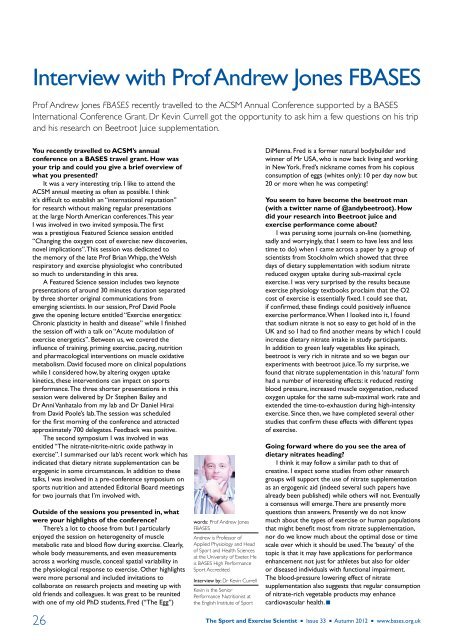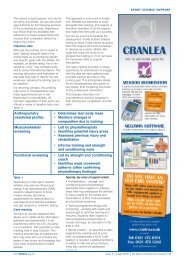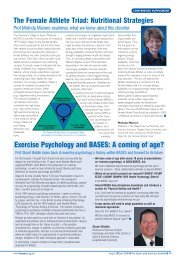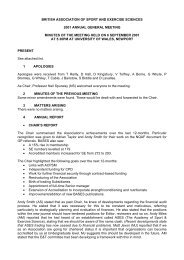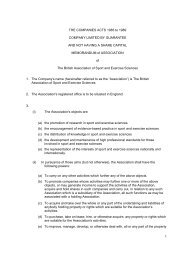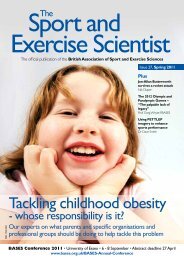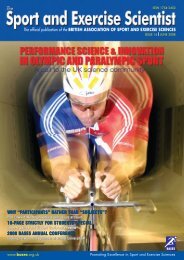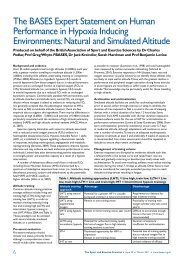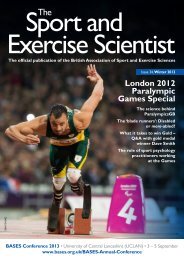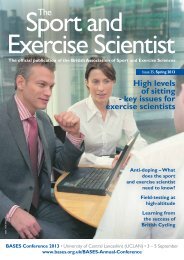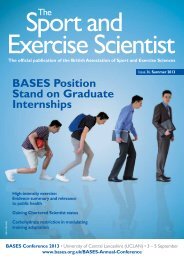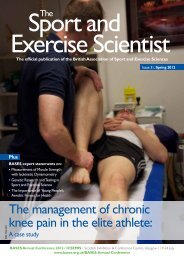Issue 33 Autumn 2012 - Bases
Issue 33 Autumn 2012 - Bases
Issue 33 Autumn 2012 - Bases
- No tags were found...
Create successful ePaper yourself
Turn your PDF publications into a flip-book with our unique Google optimized e-Paper software.
Interview with Prof Andrew Jones FBASESProf Andrew Jones FBASES recently travelled to the ACSM Annual Conference supported by a BASESInternational Conference Grant. Dr Kevin Currell got the opportunity to ask him a few questions on his tripand his research on Beetroot Juice supplementation.You recently travelled to ACSM’s annualconference on a BASES travel grant. How wasyour trip and could you give a brief overview ofwhat you presented?It was a very interesting trip. I like to attend theACSM annual meeting as often as possible. I thinkit’s difficult to establish an “international reputation”for research without making regular presentationsat the large North American conferences. This yearI was involved in two invited symposia. The firstwas a prestigious Featured Science session entitled“Changing the oxygen cost of exercise: new discoveries,novel implications”. This session was dedicated tothe memory of the late Prof Brian Whipp, the Welshrespiratory and exercise physiologist who contributedso much to understanding in this area.A Featured Science session includes two keynotepresentations of around 30 minutes duration separatedby three shorter original communications fromemerging scientists. In our session, Prof David Poolegave the opening lecture entitled “Exercise energetics:Chronic plasticity in health and disease” while I finishedthe session off with a talk on “Acute modulation ofexercise energetics”. Between us, we covered theinfluence of training, priming exercise, pacing, nutritionand pharmacological interventions on muscle oxidativemetabolism. David focused more on clinical populationswhile I considered how, by altering oxygen uptakekinetics, these interventions can impact on sportsperformance. The three shorter presentations in thissession were delivered by Dr Stephen Bailey andDr Anni Vanhatalo from my lab and Dr Daniel Hiraifrom David Poole’s lab. The session was scheduledfor the first morning of the conference and attractedapproximately 700 delegates. Feedback was positive.The second symposium I was involved in wasentitled “The nitrate-nitrite-nitric oxide pathway inexercise”. I summarised our lab’s recent work which hasindicated that dietary nitrate supplementation can beergogenic in some circumstances. In addition to thesetalks, I was involved in a pre-conference symposium onsports nutrition and attended Editorial Board meetingsfor two journals that I’m involved with.Outside of the sessions you presented in, whatwere your highlights of the conference?There’s a lot to choose from but I particularlyenjoyed the session on heterogeneity of musclemetabolic rate and blood flow during exercise. Clearly,whole body measurements, and even measurementsacross a working muscle, conceal spatial variability inthe physiological response to exercise. Other highlightswere more personal and included invitations tocollaborate on research projects and meeting up withold friends and colleagues. It was great to be reunitedwith one of my old PhD students, Fred (“The Egg”)words: Prof Andrew JonesFBASESAndrew is Professor ofApplied Physiology and Headof Sport and Health Sciencesat the University of Exeter. Heis BASES High PerformanceSport Accredited.Interview by: Dr Kevin CurrellKevin is the SeniorPerformance Nutritionist atthe English Institute of SportDiMenna. Fred is a former natural bodybuilder andwinner of Mr USA, who is now back living and workingin New York. Fred’s nickname comes from his copiousconsumption of eggs (whites only): 10 per day now but20 or more when he was competing!You seem to have become the beetroot man(with a twitter name of @andybeetroot). Howdid your research into Beetroot juice andexercise performance come about?I was perusing some journals on-line (something,sadly and worryingly, that I seem to have less and lesstime to do) when I came across a paper by a group ofscientists from Stockholm which showed that threedays of dietary supplementation with sodium nitratereduced oxygen uptake during sub-maximal cycleexercise. I was very surprised by the results becauseexercise physiology textbooks proclaim that the O2cost of exercise is essentially fixed. I could see that,if confirmed, these findings could positively influenceexercise performance. When I looked into it, I foundthat sodium nitrate is not so easy to get hold of in theUK and so I had to find another means by which I couldincrease dietary nitrate intake in study participants.In addition to green leafy vegetables like spinach,beetroot is very rich in nitrate and so we began ourexperiments with beetroot juice. To my surprise, wefound that nitrate supplementation in this ‘natural’ formhad a number of interesting effects: it reduced restingblood pressure, increased muscle oxygenation, reducedoxygen uptake for the same sub-maximal work rate andextended the time-to-exhaustion during high-intensityexercise. Since then, we have completed several otherstudies that confirm these effects with different typesof exercise.Going forward where do you see the area ofdietary nitrates heading?I think it may follow a similar path to that ofcreatine. I expect some studies from other researchgroups will support the use of nitrate supplementationas an ergogenic aid (indeed several such papers havealready been published) while others will not. Eventuallya consensus will emerge. There are presently morequestions than answers. Presently we do not knowmuch about the types of exercise or human populationsthat might benefit most from nitrate supplementation,nor do we know much about the optimal dose or timescale over which it should be used. The ‘beauty’ of thetopic is that it may have applications for performanceenhancement not just for athletes but also for olderor diseased individuals with functional impairment.The blood-pressure lowering effect of nitratesupplementation also suggests that regular consumptionof nitrate-rich vegetable products may enhancecardiovascular health.26 The Sport and Exercise Scientist n <strong>Issue</strong> <strong>33</strong> n <strong>Autumn</strong> <strong>2012</strong> n www.bases.org.uk


